Articles
- Page Path
- HOME > J Korean Acad Nurs > Volume 46(2); 2016 > Article
-
Original Article
- The Effect of K-MBSR Program on Stress, Stress Coping Style, Depression, Anger and Sleep of Middle Aged Women
- Jeong Min Park, In-Ryoung Choi
-
Journal of Korean Academy of Nursing 2016;46(2):194-206.
DOI: https://doi.org/10.4040/jkan.2016.46.2.194
Published online: April 29, 2016
Department of Nursing, College of Medicine, Seonam University, Namwon, Korea.
- Address reprint requests to: Choi, In-Ryoung. Department of Nursing, College of Medicine, Seonam University, 439 Chunhyang-ro, Namwon 55724, Korea. Tel: +82-63-620-0103, Fax: +82-63-620-0113, seonam1@hanmail.net
© 2016 Korean Society of Nursing Science
This is an Open Access article distributed under the terms of the Creative Commons Attribution NoDerivs License. (http://creativecommons.org/licenses/by-nd/4.0/) If the original work is properly cited and retained without any modification or reproduction, it can be used and re-distributed in any format and medium.
Abstract
-
Purpose
- The purpose of this study was to examine a Korean Mindfulness Based Stress Reduction (K-MBSR) program for middle aged women and to verify the program's effectiveness on stress, stress coping style, depression, anger and sleep.
-
Methods
- Fifty-two women aged from 40 to 59 (26 in the experimental group and 26 in the control group) from G city participated in the study. Data were collected from February 13 to April 3, 2013. The experimental group received 8 sessions, scheduled once a week, with each session lasting two and a half hours. Outcome variables included stress, stress coping style, depression, anger, sleep and a physiological measure (EEG).
-
Results
- There were significant decreases for stress (t=-2.14, p=.037), depression (t=-2.64, p=.011), state trait anger (t=-3.79, p<.001) in the experimental group compared to the control group.
-
Conclusion
- The findings in this study indicate that the K-MBSR program is an effective program to decrease stress, depression, and state trait anger in middle aged women.
This manuscript is a condensed form of the first author's doctoral dissertation from Seonam University.
The authors declared no conflict of interest.
- 1. Hwang YS. Application of sandplay therapy in a case of a middle-aged woman of depressive tendency. Korean J Play Ther. 2007;10(4):81–95.
- 2. Song YS. Path model analysis of stress, coping method, quality of life and spiritual maturity of middle age Christian women [dissertation]. Cheonan, Baekseok University. 2009.
- 3. Byeon WJ, Kim CK. A study on the relevant variables of middle-aged women's depression. J Korean Home Econ Assoc. 2006;44(7):125–139.
- 4. Brown JD, Mankowski TA. Self-esteem, mood, and self-evaluation: Changes in mood and the way you see you. J Pers Soc Psychol. 1993;64(3):421–430.ArticlePubMed
- 5. Lee Y. The lived experiences of the middle-aged women's anger. J Korean Acad Psychiatr Ment Health Nurs. 2007;16(4):411–419.ArticlePDF
- 6. Lee PS. Correlational study among anger, perceived stress and mental health status in middle aged women. J Korean Acad Nurs. 2003;33(6):856–864.ArticlePDF
- 7. Thomas SP, Atakan S. Trait anger, anger expression, stress, and health status of American and Turkish midlife women. Health Care Women Int. 1993;14(2):129–143. ArticlePubMed
- 8. Oh JJ, Song MS, Kim SM. Development and validation of Korea sleep scale A. J Korean Acad Nurs. 1998;28(3):563–572.ArticlePDF
- 9. Folkman S, Lazarus RS. If it changes it must be a process: Study of emotion and coping during three stages of a college examination. J Pers Soc Psychol. 1985;48(1):150–170.ArticlePubMed
- 10. Kang G, Oh S. Effects of mindfulness meditation program on perceived stress, ways of coping, and stress response in breast cancer patients. J Korean Acad Nurs. 2012;42(2):161–170. ArticlePubMed
- 11. Park K, Jun JS, Jung SY. The effects of Korean mindfulness based stress reduction program on the psychological symptoms, sleep and quality of life, in Korea breast cancer patients. Korean J Stress Res. 2013;21(3):249–262.
- 12. Kabat-Zinn J. Chang HK Kim KH Jang JY . Full catastrophe living: Using the wisdom of your body and mind to face stress, pain, and illness. 2nd ed. Seoul: Hakjisa Corp.; 2005.
- 13. Lee WK, Bang HJ. The relationship among stress of adult women, mindfulness, self-compassion, psychological well-being and psychological symptoms. Korean J Dev Psychol. 2008;21(4):127–146.
- 14. Bae JH. Effects of K-MBSR program according to the length of the training period on emotional response of college students. J Korea Contents Assoc. 2010;10(11):198–208. Article
- 15. Yoon BS. Effect of K-MBSR on attention: CAMS-R, ANT, and sLORETA. Korean J Psychol Gen. 2012;31(2):521–540.
- 16. Choo KS, Song HJ. Effects of K-MBSR program on depression anxiety, and stress coping: Mothers with disabled children. Korean J Psychother. 2009;9(1):113–128.
- 17. Leventhal H, Cameron L. Behavioral theories and the problem of compliance. Patient Educ Couns. 1987;10(2):117–138. Article
- 18. Koh KB, Park JK, Kim CH. Development of the stress response inventory. J Korean Neuropsychiatr Assoc. 2000;39(4):707–719.
- 19. Peniston EG, Marriman DA, Deming WA, Kulkosky PG. EEG alpha-theta brain wave synchronization in Vietnam theater veterans with combat related post traumatic stress disorder and alcohol abuse. Med Adv Med Psychother. 1993;6:37–50.
- 20. Kim JH, Lee CH. The relationships of configuration factors and depression of stress coping style. J Behav Sci. 1985;7(1):127–138.
- 21. Chon KK, Choi SC, Yang BC. Integrated adaptation of CES-D in Korea. Korean J Health Psychol. 2001;6(1):59–76.
- 22. Henriques JB, Davidson RJ. Left frontal hypoactivation in depression. J Abnorm Psychol. 1991;100(4):535–545.ArticlePubMed
- 23. Chon KK, Hahn DW, Lee CH, Spielberger CD. Korean adaptation of the state-trait anger expression inventory: Anger and blood pressure. Korean J Health Psychol. 1997;2(1):60–78.
- 24. Chang HK, Kim JM, Bae JH. The development of Korean version of mindfulness-based stress reduction program and the effects of the program. Korean J Health Psychol. 2007;12(4):833–850.Article
- 25. Dykens EM, Fisher MH, Taylor JL, Lambert W, Miodrag N. Reducing distress in mothers of children with autism and other disabilities: A randomized trial. Pediatrics. 2014;134(2):e454–e463. ArticlePubMedPMCPDF
- 26. Shim JY, Kim YH. Effects of brain respiration training on electroencephalogram and depressive state in old women. Korean J Sport Psychol. 2006;17(4):117–133.
- 27. You SY. The effects of mindfulness meditation on symptoms of hwa-byung depression, anxiety and stress: in middle aged women [master's thesis]. Seoul, Duksung Women's University. 2010.
- 28. Cincotta AL, Gehrman P, Gooneratne NS, Baime MJ. The effects of a mindfulness-based stress reduction programme on pre-sleep cognitive arousal and insomnia symptoms: A pilot study. Stress Health. 2011;27(3):e299–e305. Article
- 29. Winbush NY, Gross CR, Kreitzer MJ. The effects of mindfulness-based stress reduction on sleep disturbance: A systematic review. Explore (NY). 2007;3(6):585–591. ArticlePubMed
- 30. Lee KH, Park KM, Ryu MK. The effect of aromatherapy with lavender essential oil on sleep disturbance and depression on middle-aged women. J Korean Soc Matern Child Health. 2002;6(1):23–37.
REFERENCES
Figure & Data
REFERENCES
Citations

- Anger-Related Problems and Sleep Disturbances in Adolescents Playing Massively Multiplayer Online Role-Playing Games
Ummugulsum Gundogdu
Sleep and Vigilance.2023; 7(1): 79. CrossRef - A Systematic and Comparative Review of Behavior Change Strategies in Stress Management Apps: Opportunities for Improvement
Mona Alhasani, Dinesh Mulchandani, Oladapo Oyebode, Nilufar Baghaei, Rita Orji
Frontiers in Public Health.2022;[Epub] CrossRef - A Narrative Inquiry into Middle-aged Women who Experienced the Residential Independence of Never-married Children
Soonbum Kwon, Meejung Chin
Family and Environment Research.2022; 60(3): 391. CrossRef - Factors influencing the health-related quality of life in Korean menopausal women: a cross-sectional study based on the theory of unpleasant symptoms
Ji-Hyun Kang, Moon-Jeong Kim
Korean Journal of Women Health Nursing.2022; 28(2): 100. CrossRef - Mindfulness-based programmes for mental health promotion in adults in nonclinical settings: A systematic review and meta-analysis of randomised controlled trials
Julieta Galante, Claire Friedrich, Anna F Dawson, Marta Modrego-Alarcón, Pia Gebbing, Irene Delgado-Suárez, Radhika Gupta, Lydia Dean, Tim Dalgleish, Ian R White, Peter B Jones, Vikram Patel
PLOS Medicine.2021; 18(1): e1003481. CrossRef - The effects of mindfulness stress reduction program on postmenopausal women's menopausal complaints and their life quality
Nurdilan Şener, Sermin Timur Taşhan
Complementary Therapies in Clinical Practice.2021; 45: 101478. CrossRef - Effects of Forest Therapy on Health Promotion among Middle-Aged Women: Focusing on Physiological Indicators
Bum-Jin Park, Chang-Seob Shin, Won-Sop Shin, Chung-Yeub Chung, Si-Hyung Lee, Dong-Jun Kim, Youn-Hee Kim, Chang-Eun Park
International Journal of Environmental Research and Public Health.2020; 17(12): 4348. CrossRef - Effect of virtual reality meditation on sleep quality of intensive care unit patients: A randomised controlled trial
Soon Young Lee, Jiyeon Kang
Intensive and Critical Care Nursing.2020; 59: 102849. CrossRef - Effects of aromatherapy on stress, fructosamine, fatigue, and sleep quality in prediabetic middle-aged women: A randomised controlled trial
Myung-Haeng Hur, Jun Hwa Hong, SeongHee Yeo
European Journal of Integrative Medicine.2019; 31: 100978. CrossRef - Sahaj Samadhi meditation vs a Health Enhancement Program in improving late-life depression severity and executive function: study protocol for a two-site, randomized controlled trial
Stephen Benjamin Peckham, Emily Ionson, Marouane Nassim, Kevin Ojha, Lena Palaniyappan, Joe Gati, Jean Thebérge, Andrea Lazosky, Mark Speechley, Imants Barušs, Soham Rej, Akshya Vasudev
Trials.2019;[Epub] CrossRef - Mindfulness-based Stress Reduction Program for Psychiatric Inpatients
Hye Min Hong, Sun Joo Jang
Journal of Korean Academy of Psychiatric and Mental Health Nursing.2017; 26(3): 271. CrossRef
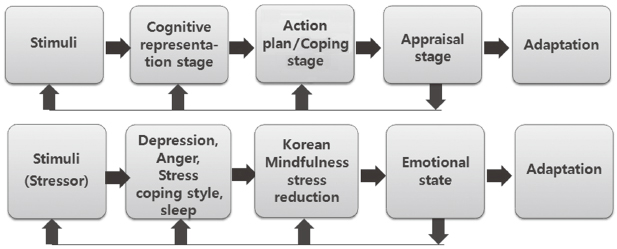
Figure 1
Mindfulness Meditation Program
Homogeneity Test of General Characteristics for Two Group (N=52)
Exp.=Experimental group; Cont.=Control group.
Homogeneity Test of the Dependent Variables for Two Groups (N=52)
Exp.=Experimental group; Cont.=Control group; A2=(R - L)/(R+L), (R=absolute of rt. hemisphere, L=absolute of lt. hemisphere).
Differences in Variables for Experimental and Control Group (N=52)
Exp.=Experimental group; Cont.=Control group; M=Mean; SD=Standard deviation; A2=(R - L)/(R+L), (R=absolute of rt. hemisphere, L=absolute of lt. hemisphere).
Exp.=Experimental group; Cont.=Control group.
Exp.=Experimental group; Cont.=Control group; A2=(R - L)/(R+L), (R=absolute of rt. hemisphere, L=absolute of lt. hemisphere).
Exp.=Experimental group; Cont.=Control group; M=Mean; SD=Standard deviation; A2=(R - L)/(R+L), (R=absolute of rt. hemisphere, L=absolute of lt. hemisphere).
 KSNS
KSNS
 E-SUBMISSION
E-SUBMISSION

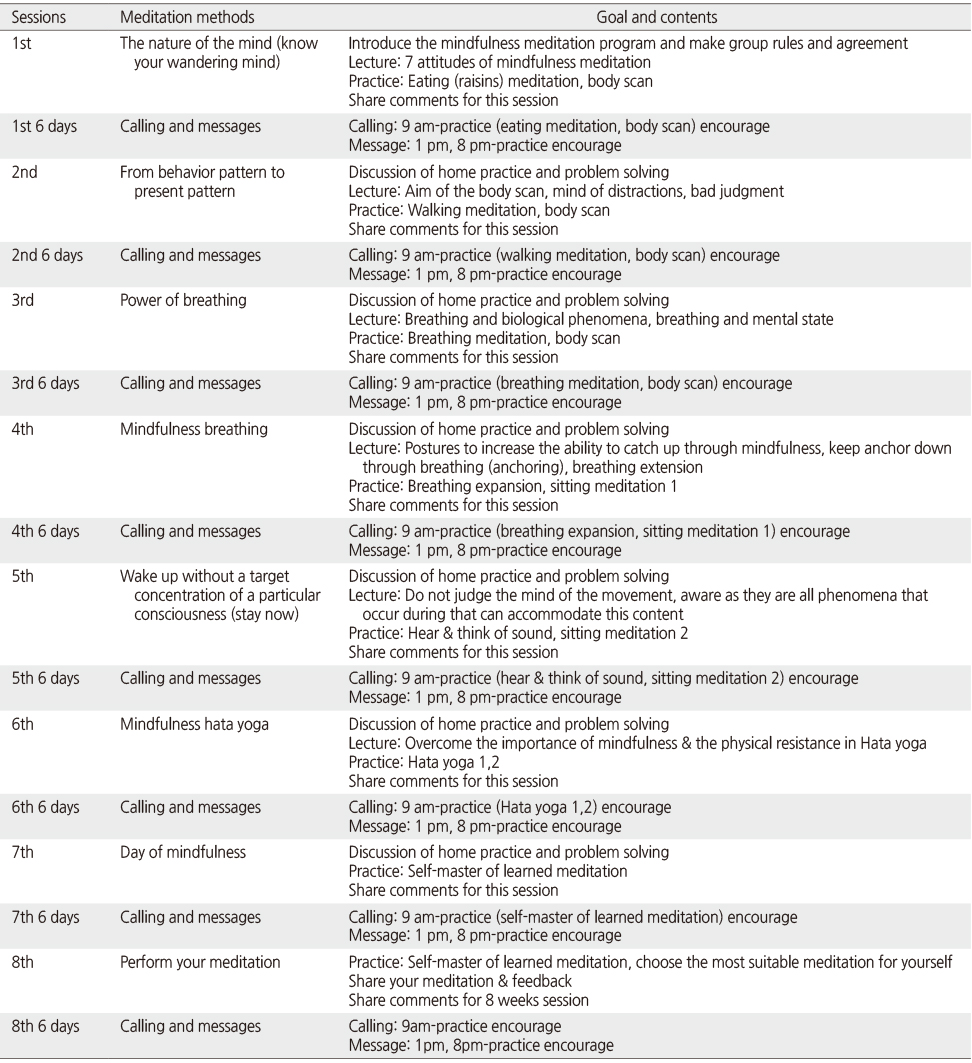
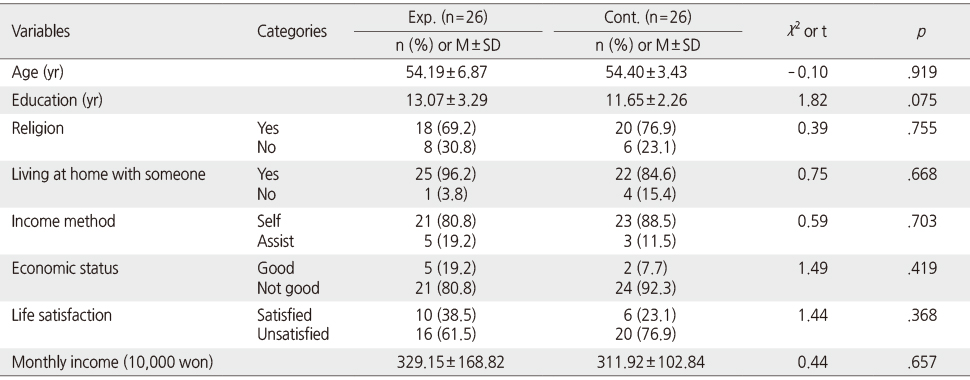
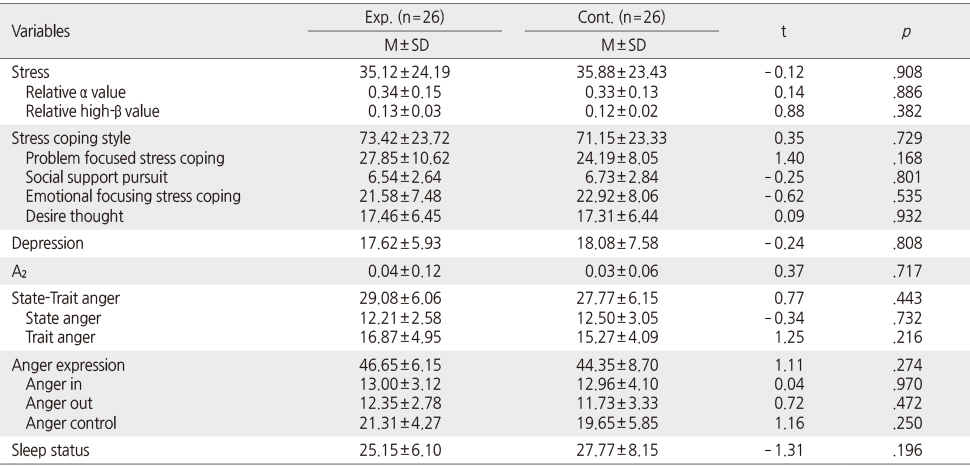
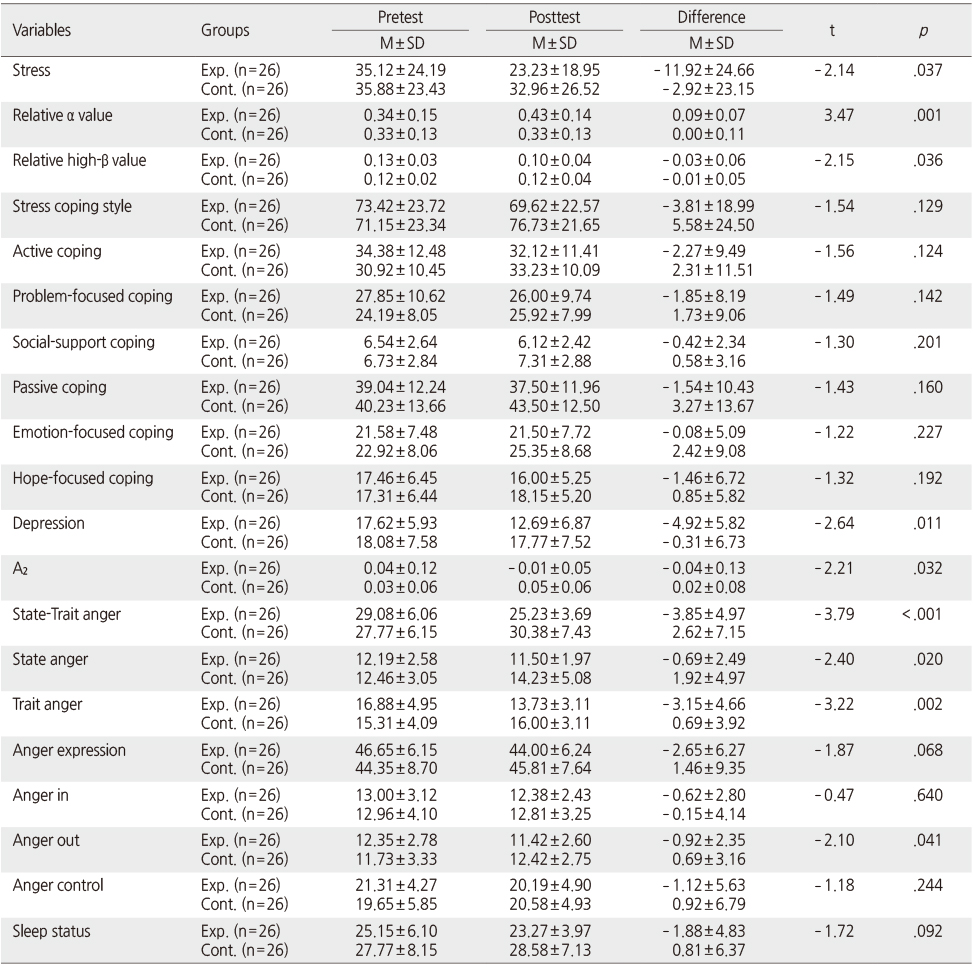
 Cite
Cite

